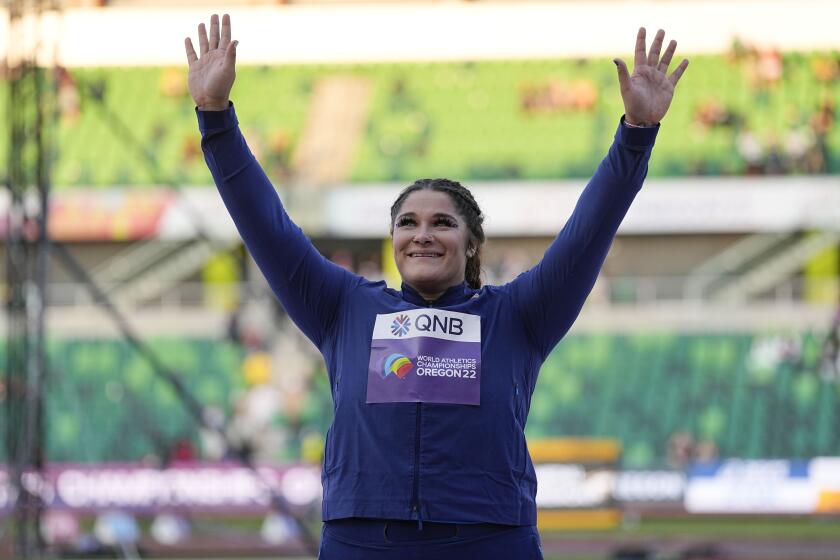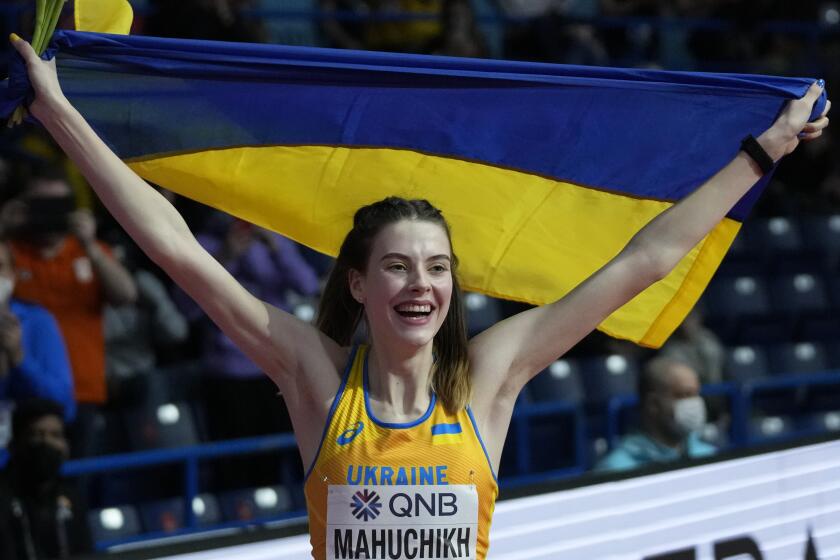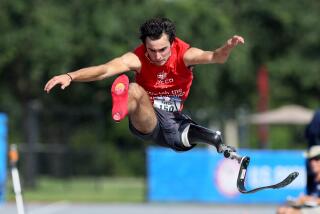Devon Allen’s storybook ending wiped out in 0.001 of a second at world championships
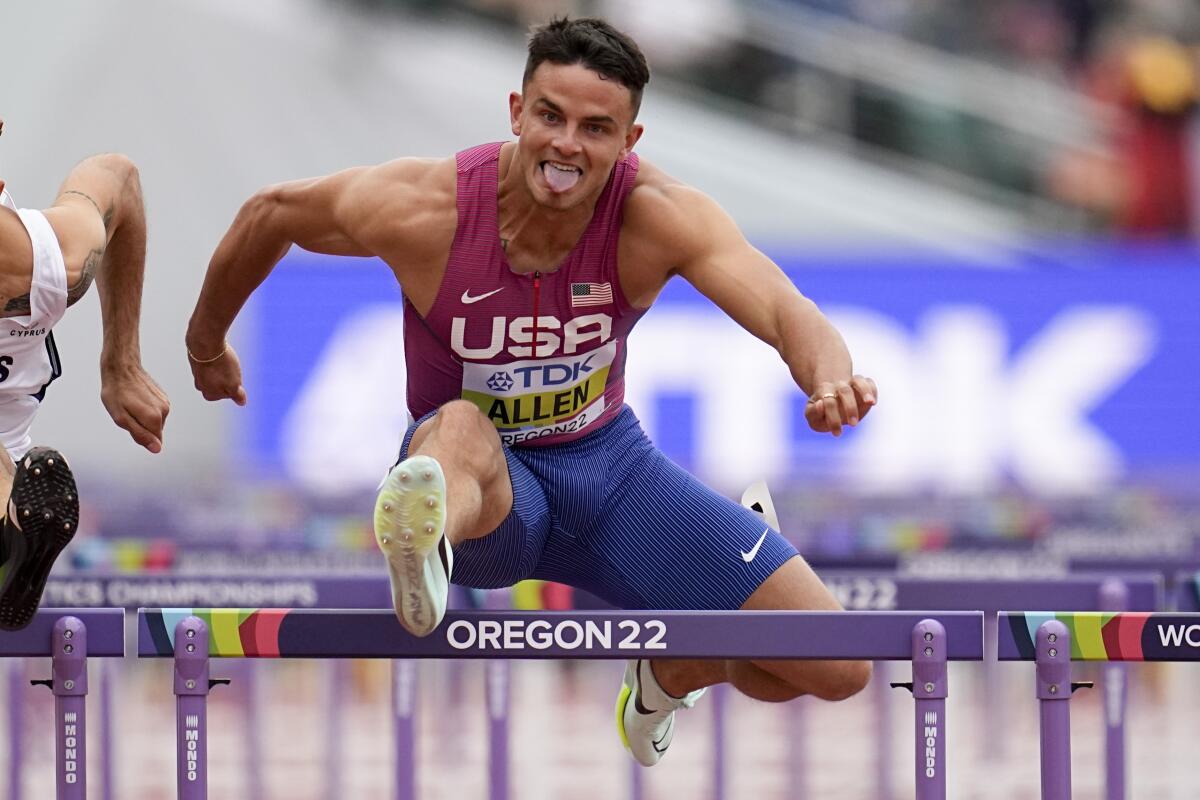
- Share via
EUGENE, Ore. — Devon Allen curled into his starting blocks Sunday evening at Hayward Field believing the next 12 to 13 seconds could change his life.
All it took was one one-thousandth of a second.
Back in the city where he won an NCAA championship and qualified for the 2016 Olympics in front of roaring, sympathetic crowds while starring at Oregon, Allen was three strides into the world outdoor track and field championships’ 110-meter final when he heard the second burst of the starting gun, the sport’s signal of a false start. He thought he was fine, that his start was clean.
Almost.
Sensors on the blocks gauged that Allen emerged from his blocks 0.099 seconds after the gun, one one-thousandth of a second faster than World Athletics’ allowable limit of 0.1 — in other words, one one-thousand of a second from what the sport’s global governing body technically considers the perfect start.
Instead, it was the start of a nightmare evening that left him shaking his head nearly an hour later.

“When I was flagged, I was very surprised, which was also part of the frustration because I know for a fact that I didn’t react until I heard the gun,” Allen said. “And to be one one-thousands too quick, which, I know I’m quick, but, kind of sucks.”
With Allen missing from the third lane, and Jamaican Hansle Parchment, the Olympic gold medalist in Tokyo, missing from lane five following an injury suffered in warmups minutes before the final, when he clipped a hurdle and injured a leg, American Grant Holloway ran in lane four surrounded on either side by a vacant lane. Without a peripheral visual aid that would allow him to gauge where he stood, he felt as if he were at practice, not defending his 2019 world outdoor championship.
It didn’t matter. He won gold in 13.03 seconds and, crossing the line, lifted his thumb and pinkie into the shape of a phone and held it to his ear.
“It’s just one of those things where it’s athletics. Excuse my language, but s--- happens,” Holloway said. “Hansle goes down, Devon false starts, it’s just one of the things where you center yourself, you refocus, and you execute 10 hurdles and you got to be the first one to the finish line before anybody else.”
The American women are coming off an Olympics in which they won 15 medals only 15 years after winning six. Who and what is driving this talent surge?
American Trey Cunningham was second in 13.08, and Asier Martinez of Spain was third in 13.17.
Allen’s disqualification was one of few breaks that didn’t go the Americans’ way on a day they collected nine medals, the most by a country on a single day in any World Athletics championship, breaking the previous high of eight by the Soviet Union in 1991. It was also the first time a country had won four gold medals — by Holloway, Ryan Crouser in the men’s shot put, Katie Nageotte in the women’s pole vault and Brooke Andersen in women’s hammer throw — in one day.
Cunningham dubbed the four minutes of uncertainty from the time of the false start to the moment Allen was ushered off the track — a decision one fan could be heard calling “bulls---” clearly across the $270-million stadium — “the false-start fiasco.”
“We thought he should have stayed,” Cunningham said. “Even the people who were in the stands next to us were like, he should be in the blocks. I don’t think that’s because he’s an American. I think that’s because he didn’t false start.”
Said Holloway: “Even when the gun went off and we had a callback, they said false start lane three. … I even told Devon, ‘Go protest.’ ”
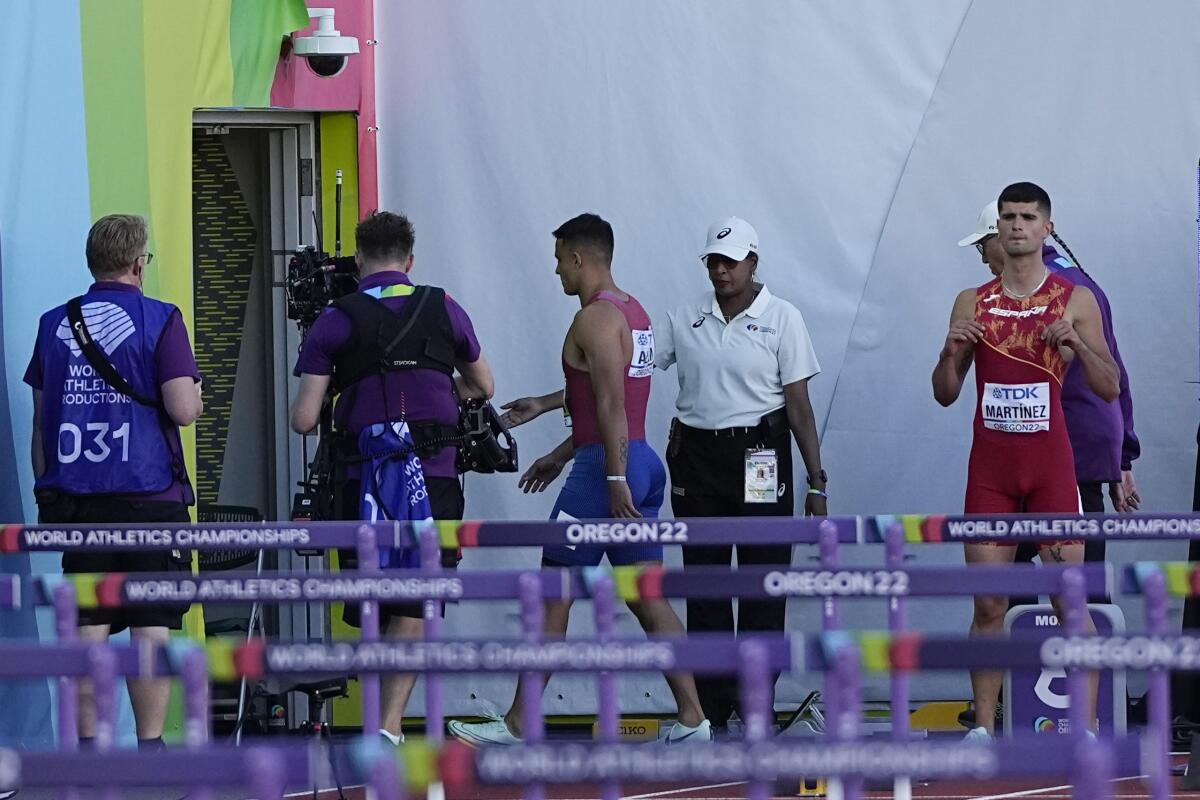
Allen did, crossing the track to the inside railing to speak with two officials four times, each time returning to stand behind his blocks while awaiting a resolution. When one official finally showed him two red cards, boos were heard as fans realized Allen’s potential storybook return to Oregon was no longer possible. It had not been easy for Allen to reach the final. His father, Louis, died in June on the day Allen qualified for worlds at the U.S. championships. He ran with a four-year-old tattoo on his left hand that had become more poignant in the last month: the title of his father’s favorite song, “Everybody Loves The Sunshine.”
Then, four days before the final, Allen said he injured his hamstring, and his semifinal qualification earlier Sunday afternoon had not come with the kind of ease expected from someone who in June posted the third-fastest-time ever of 12.84 seconds. Hanging over the night was also the uncertainty of when Allen will race again. He reports to Philadelphia Eagles’ training camp July 26 for his attempt to make the roster as a wide receiver, the position he played at Oregon before knee injuries led him to leave football in 2016 to focus on track.
“My goal is to be the best hurdler ever, and I still have a chance to do that,” Allen said. “And my goal is to play in the NFL and help the Eagles right now, win a Super Bowl, so there’s not really much I can do. It’s just one race, which is frustrating.
Ukraine’s track and field athletes believe there is power in claiming territory, whether around battered cities or atop an awards podium.
“Track and field is so difficult because you train the whole year for one competition that lasts 12 seconds, 13 seconds, and that’s that. It’s kind of like your identity is based on that one competition, which is frustrating, but it happens and I’ll learn from it and I’ll make sure I just kind of react not as fast next time.”
Steve Magness, a former college coach, noted on Twitter that in 2009, World Athletics commissioned a study to determine “neuromuscular reaction to the auditory signal used in the sprint start.” Translation: How fast can humans actually react to a starting gun? The results, which tested seven top Finnish sprinters, found that some had reacted as fast as 80 milliseconds.
“They recommend that the 100ms limit be lowered to 80 or 85 ms,” said an announcement of the findings, “and that the IAAF urgently examines possibilities for detecting false starts kinematically, so that judges’ decisions are based on the first visible movement regardless of body part.”
Thirteen years later, the 100-millisecond standard remains. As will the world championship result next to Allen’s name: did not start.
More to Read
Go beyond the scoreboard
Get the latest on L.A.'s teams in the daily Sports Report newsletter.
You may occasionally receive promotional content from the Los Angeles Times.

